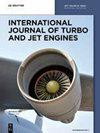使用叶片作为涡流发生器的亚音速射流控制
IF 0.9
4区 工程技术
Q4 ENGINEERING, AEROSPACE
引用次数: 2
摘要
本文通过数值模拟研究了以叶片为涡流发生器的射流被动控制问题。叶片位于喷嘴内部出口附近,与射流的纵向方向倾斜。考虑了两种配置,即直叶片(k=0 mm−1)和弯曲叶片(k=0.05毫米−1)。曲率k被定义为叶片半径的倒数。由于叶片的存在而造成的堵塞为0.5%。沿射流中心线和径向距离的总压力变化是在马赫数为0.4、0.6和0.8时从喷嘴出口确定的。研究发现,与基础喷嘴(平面圆形喷嘴)相比,叶片在近场和远场都会导致更快的射流衰减,弯曲叶片在促进射流混合方面比直叶片表现得更好。弯曲的叶片最大限度地减少了54%的射流潜在核心长度,并且由于喷嘴内部存在叶片,射流变得不对称,如径向压力衰减图和马赫数等值线所示。本文章由计算机程序翻译,如有差异,请以英文原文为准。
Control of subsonic jets using vanes as vortex generators
Abstract The passive control of jets using vanes as vortex generators is studied by numerical simulation in this paper. The vanes are positioned inside the nozzle near the exit, inclined to the flow with the longitudinal direction of the jet. Two configurations namely, straight vanes (k = 0 mm−1) and curved vanes (k = 0.05 mm−1) are considered. Curvature k is defined as the reciprocal of the radius of the vanes. The blockage due to the presence of the vanes is 0.5%. The total pressure variation along the jet centreline and along the radial distance is determined from nozzle exit at a Mach number of 0.4, 0.6 and 0.8. It is found that the vanes cause faster decay of the jet, both in the near field and far field compared to the base nozzle (plain circular nozzle) and the curved vanes perform better than the straight vanes in promoting the jet mixing. A maximum of 54% reduction in jet potential core length is achieved by the curved vanes and the jet becomes asymmetrical due to the presence of the vanes inside the nozzle, as observed in the radial pressure decay plots and Mach number contours.
求助全文
通过发布文献求助,成功后即可免费获取论文全文。
去求助
来源期刊

International Journal of Turbo & Jet-Engines
工程技术-工程:宇航
CiteScore
1.90
自引率
11.10%
发文量
36
审稿时长
6 months
期刊介绍:
The Main aim and scope of this Journal is to help improve each separate components R&D and superimpose separated results to get integrated systems by striving to reach the overall advanced design and benefits by integrating: (a) Physics, Aero, and Stealth Thermodynamics in simulations by flying unmanned or manned prototypes supported by integrated Computer Simulations based on: (b) Component R&D of: (i) Turbo and Jet-Engines, (ii) Airframe, (iii) Helmet-Aiming-Systems and Ammunition based on: (c) Anticipated New Programs Missions based on (d) IMPROVED RELIABILITY, DURABILITY, ECONOMICS, TACTICS, STRATEGIES and EDUCATION in both the civil and military domains of Turbo and Jet Engines.
The International Journal of Turbo & Jet Engines is devoted to cutting edge research in theory and design of propagation of jet aircraft. It serves as an international publication organ for new ideas, insights and results from industry and academic research on thermodynamics, combustion, behavior of related materials at high temperatures, turbine and engine design, thrust vectoring and flight control as well as energy and environmental issues.
 求助内容:
求助内容: 应助结果提醒方式:
应助结果提醒方式:


